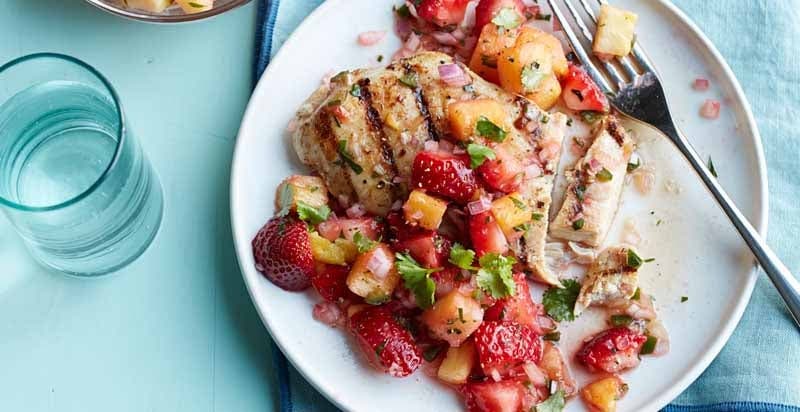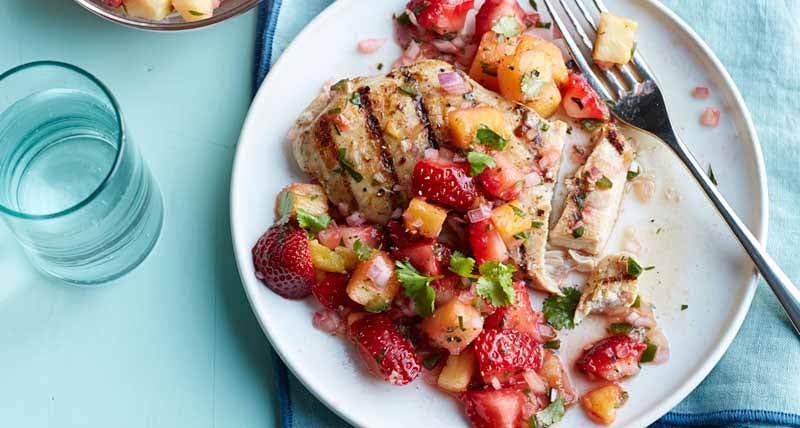Five Ways to Add Flavour to Chicken Breast Without Adding Fat


Yep – that’s right; chicken breast is now 0 SmartPoints! That means you can freely incorporate this staple into many different dishes to help form your daily menu. Here we have rounded up five easy ways to impart maximum flavour into chicken breast, without adding unwanted fats.
Are you tired of eating chicken breast that tastes like old cardboard? Convinced that added fat is the only way to inject a dose of much-needed flavour into otherwise bland white meat? Stop worrying that you’re fated to a lifetime of overcooked and underseasoned chicken breasts and give one these simple methods a try.
A quick note on prepping chicken breasts
If you’re going to be grilling, barbecuing, or pan-frying chicken breasts in a skillet it’s important to pound them so that they’re a uniform thickness. Use a kitchen mallet or rolling pin (the flat sides of heavier canned goods also work in a pinch) to whack the chicken until its a few centimetres thick throughout. To make cleanup easier place the chicken in a sturdy freezer resealable bag or between two sheets of waxed paper. This technique not only ensures even and fast cooking, pounding chicken breasts will actually help to tenderize them.
Poaching
Poaching is an often-overlooked method of cooking chicken breast, bringing to mind retro chicken salad recipes and jellied aspics. In fact, poaching chicken breasts is an elegant technique and guarantees moist and tender chicken that can be used in salads, cold noodle salads, tacos, and soups. The idea behind poaching is to gently simmer, not boil, the chicken until evenly cooked in a regular or wine-based broth. Fresh herbs such as parsley, cilantro, thyme, and lemon verbena as well as sliced gingerroot, lemongrass, white whole peppercorns, dried mushrooms, citrus slices, celery stalks, and thinly sliced leeks can all be added to the poaching liquid to increase flavour complexity.
Marinating
Marinating chicken breasts might seem like a no-brainer but did you know that certain marinades are more likely to produce super-flavourful chicken over others? Try using plain yogurt or buttermilk as a base for your marinade, the lactic acid in these dairy products will work to tenderize the proteins in the chicken. Lemon, orange, and lime juice all have a similar effect and can in fact be combined with dairy products to produce show-stopping chicken breasts with incredible flavour and texture. If possible, allow chicken breasts to marinate overnight or freeze chicken in its marinade for up to three months.
Roasting with the skin on
Full of flavour (and saturated fat) chicken skin has an important role when roasting a whole bird or just the breasts, it forms a barrier so that excess moisture stays trapped in the meat. Next time you’re cooking chicken breasts try preparing them with the skin on and then removing it after the cooking is done (give them 5-10 minutes to rest after they come out of the oven and the skin will come off with little to no effort). You’ll find that the meat stays incredibly tender and full of intense savoury flavour, enough so that you won’t even miss the skin. Keep in mind that if the skin is consumed, the chicken breast would no longer be 0 SmartPoints.
Wet brining
Wet brining is a technique that involves soaking poultry or other meat in a solution of water and kosher salt for an extended period of time. Wet brining accomplishes two things; it helps reduce natural moisture loss that occurs during the cooking process and the salt in the brine actually breaks down the proteins in the chicken breast which results in a very tender finished product. Chicken breasts only need to be brined for a couple of hours to get fantastic results, a concentration of ½ cup of salt to about a litre of water will be enough to brine several servings. Salt and water are merely the basic ingredients in a brine and depending on the type of recipe the chicken is being used in you can feel free to add cut up citrus, peppercorns, star anise, cloves, sugar or honey.
Dry brining
Dry brining is a fancy term for generously rubbing meat and poultry with salt and it works very similarly to wet brining. Dry brining is especially conducive to chicken breasts because it ensures the outside of the chicken doesn’t get soggy while the inside of the chicken breast remains juicy. To dry-brine chicken breasts rub them with a generous amount of kosher salt and allow to sit in the fridge uncovered for at least an hour and up to 24 hours. If possible, place the chicken on a baking rack overtop of a large tray, this will allow the air to circulate around the whole chicken breasts and ensure a crispy outside. The kosher salt can be mixed with the dried spices of your choice, including but not limited to smoked paprika, curry powder, cumin, chili powder and herbes de Provence.
